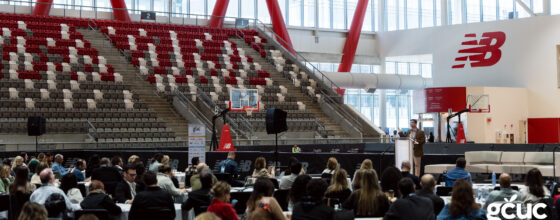Coworking Megatrends 2024 – A new vertical emerges

Before you begin, I recommend you have a look back at my megatrends from last year. It’s still pretty spot on if I do say so myself. Then pop right back!
Every year I put out a megatrends article on how I see the industry moving forward. I talk to leaders, I read everyday and I spend a lot of time just thinking about the future.
The elephant in the room
Let’s get the WeWork bankruptcy out of the way…literally no one should be surprised. They made it very clear for a long time that this was coming. They alerted landlords, replaced board members with bankruptcy experts and leaked it to the press. This is not an indication of how the coworking/flex world is doing. This is a highly unique case with an insanely dysfunctional storyline worthy of multiple books, podcasts and movie productions.
I believe this will be a very complex and tangled bankruptcy that will take a great deal of time to unwind.This is WeWork using bankruptcy to negotiate more favorable terms. This works well in the US and Canada, not so much for the rest of the world.
I do think there is a slight chance we could see the likes of Mark Dixon or even Adam Naumann himself come in for a complete takeover. I don’t know enough about bankruptcy to know if this is even a real possibility but it sure would be fun to watch. It will probably just mean a much smaller firm will emerge with a real shot at surviving.
Workplace hospitality
Newsflash: Coworking was placed in the wrong vertical. Our primary business isn’t acquiring space, selling, managing or holding an asset. Our primary business is to be of service to the people who utilize our spaces to conduct business for a broad range of times from hourly to annually. Coworking operators do need to understand real estate and how it works on a deep level, and I would venture to say they need to understand and embrace hospitality even more.
Coworking started moving to management agreements as far back as 2013 when Benjamin Dyett of Grind said on stage at GCUC that he was never signing another lease. I signed two leases—one in 2010 and one in 2013—and in 2015 did a management agreement. The management agreement was a much better arrangement. This is also why WeWork identifies as real estate: they signed leases. Most operators are doing a joint venture or management agreements in coworking (similar to the hotel model).
Take a look at leaders you admire in the industry and you will find the vast majority have switched or are already identified on Linkedin as in the hospitality industry. FORA, Industrious and Convene to name a few. You can also read more about my reasoning here on Workplace Design Magazine.
Nomenclature refresh
Coworking operators strive to create space with belonging, connection and community. Flex office is the latest term used to describe flexible lease terms and creating smaller space. It’s a terrible term for search optimization and it creates confusion. The real estate world has fully embraced this new confusing terminology. Think of it as the next iteration of business center to executive suite to space as a service. All lame. I will reference it since the real estate industry seems smitten with it. If you believe that human connection matters, I suggest you hang onto the term coworking, flex is not a good term for coworking operators.
So why are touchy, feely, kumbaya spaces needed? It’s simple: we’re still a depressed, anxious and addicted world. We desperately need space where people feel seen, where people can connect and be a part of a community. It’s vital to the future of humanity. At GCUC we’ve been talking about the loneliness epidemic and the need to address it since 2017.
Real estate reckoning 3.0
Last year I predicted this was four years out. Today I’m predicting that the real estate reckoning 3.0 will come in the next two years at most—most likely in 2024. What does this mean? We’re going to see an overarching economic impact globally as more and more tenants give back under-utilized space, followed by a banking crisis. Real estate is ripe for disruption and the time has come. This will lead to innovation galore and a reset of markets.
We will be forced to re-image spaces, cities, transportation and more. This is the next industrial revolution I did presentations about at GCUCs (USA, China and Canada) starting in 2016. This revolution isn’t due to AI or IOT or any technology, it is fueled by the changing nature of work. I believe this is a great time to enter the market and a fantastic opportunity for growth. Get your war chest ready there is about to be a bloodbath.
Amenities are king
Everyone has wifi, meeting rooms and coffee. What are you doing that is better than home? I recently chose a Soho House over a coworking space because I needed to eat and didn’t want to deal with food delivery. Can you offer healthy meals to take home for your family’s dinner? A personal trainer in the parking lot working out of a fully outfitted storage container? Gift shopping and running errands? A portion of membership that goes to support a charity? Specialized air that is filtered and enhanced with a little extra oxygen? Electric bikes for running errands as a perk? Hard to get reservations for you and that special someone?
You have to be better than home and you have to be better than the coworking space or membership club down the street. Figure out exactly who you are and what you stand for and reflect that in your offering. I would be remiss if I didn’t point out that you have to have a focus on sustainability or you will be left behind.
The dirty little secret
It’s hard to have good margins in coworking. Why, you ask? Let me break it down:
- Inflation: Literally everything is more expensive (especially in America)
- Talent: It’s hard to attract and retain (meaning pay competitive salaries) talent and it takes a lot of humans in a hospitality focused business
- Competition: Some of the larger competitors are paying really high broker commissions and instigating a race to the bottom on pricing
- Complexity: F&B, talent, software, sustainability, furniture, cleaning, repairs, event management, website, advertising, social media, locks, tours, training, construction, procurement … I could go on and on but this should suffice.
Impact of economic uncertainty and global atrocities
We can all agree that the planet is getting hotter and socio economic uncertainty is a given. It’s not whether or not you will be affected, it’s when. COVID taught us that things can change on a global scale with no notice. This is life. Embrace that it will always be messy.
The Forecast
Coworking continues to thrive
We spend the majority of our days at work. We as human beings need, deserve and crave human connection. The loneliness epidemic is only worsened by people working at home, alone. Coworking operators focused on building relationships within the space will thrive next to a space providing a space for the sake of space (ie flex).
Hybrid is here to stay
We had a taste of freedom during COVID and we’re not giving that up. If you want to attract and retain the best talent, you will allow them to work where, when and how they like. The US will lead the way as we’re known for starting revolutions and our growth backs that up.. The rest of the world will follow, some more quickly than others. Asia will likely be the last.
Post pandemic we’re also seeing a surge in independent workers/freelancers/self-employed who have traditionally been drawn to coworking. In the words of my friend and fellow researcher, Steve King “ Even the number of small startups has increased significantly, although VC seed and series A seed funding is way down.” These groups have been a staple in coworking for over a decade.
Mergers and acquisitions and growth, oh my
Have you seen what IWG is doing? Their growth is phenomenal and profitable. If you own real estate in the world, you have heard from IWG, they’re targeting everyone. I would never count out Mark Dixon. Industrious is up 40% this year and up 300% since 2019 (Bloomberg). I will continue to quote Steve King from 2011: “You can’t build them fast enough for the demand coming your way.” This was true then and it’s true now.
The changing nature of work will continue to drive demand. A great deal of that demand is coming from corporations that are embracing hybrid in order to attract and retain great talent. Thinking about entering the market? Opportunity abounds.
Future Proof Yourself
Here are my suggestions for what you should be doing to help future proof yourself:
- Raise your prices. Everyone else has, why haven’t you?
- Re-design. We mentioned this last year. The world has changed. Has your space?
- Amenities are king. Get busy, get inspired and surprise us.
- Work on financing for growth. Opportunities are coming.
- If you don’t have an ESG & DEI strategy, get one. Pronto.
- Learn how to harness the power of AI. This should bolster your running and administration of your spaces, it’s like getting an employee for free (which can help in profitability.)
- Help others. We’re collaborators not competitors in this workplace hospitality vertical.
- Focus on belonging. You have a moral obligation to create space that offers belonging, connection and community.
In conclusion, WeWork is not an indication of how coworking is doing, but maybe a canary in the coal mine for the real estate industry and a bigger global correction. The coworking industry is in the workplace hospitality vertical. If you believe in the power of connection and belonging we encourage you to use the term coworking over the lame flex terminology. We still have work to do in profitability, ESG, DEI, design, retention and more. Opportunities abound as the world continues to find homeostasis after a global pandemic. It’s a great time to enter the market and soon will be a great time to expand as landlords will need seasoned operators more than ever. Buckle up, it’s about to be an exciting ride.
GCUC is looking to grow and expand as well. We grow through licensing with partners. If you would like a GCUC in your country, please reach out to [email protected] and we will send you more information.
We will be hosting GCUC in North America this April (location announcement coming soon). Join our mailing list to stay up to date. And join the GCCU Community to stay in touch 24/7/365, gain access to our vast resource library and get discounts on your next ticket!
Our rapidfire megatrends podcast will be coming soon to the GCUC Podcast.
Links and more info can be found on gcuc.co.
I hope you enjoyed our annual megatrends rant. More to come! Stay juicy and be kind to each other. We still have a lot of work to do!







